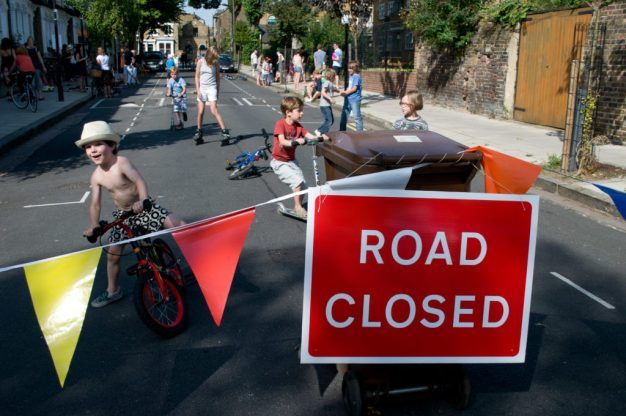
Parents of UK schoolchildren ‘support’ local traffic-calming measures – survey
Parents with children of school age (4-18 years) in the UK are in support of safer crossings, lower speed limits (and car-free zones outside schools.
A YouGov survey commissioned by Living Streets, the UK charity for everyday walking, ahead of Walk to School Week (5-9 October 2020), also found support for banning pavement parking (49 per cent) and efforts to reduce so-called ‘rat-running’, where motorists use residential areas as a short cut for getting to and from their destinations. (44 per cent).
The parents polled believed the biggest benefits of walking to school for their children were being physically fitter (88 per cent), getting fresh air (84 per cent), being cost-free (72 per cent) and reducing congestion (71 per cent). Feedback also showed that parents believe physical distancing “is easier when walking” and that walking to school allowed their children to learn road safety and independence skills.
Fewer than half of primary school children currently walk to school
The Government has provided £225 million for councils to install emergency active travel measures that meet the needs of their communities. Some councils’ schemes have attracted controversy, but the poll reveals a “silent majority” are in favour. Living Streets is campaigning for action to encourage families to choose to walk, scoot or cycle to school.
Mary Creagh, Chief Executive, Living Streets said: “Every child should be able to walk to school safely, and enjoy the fresh air, freedom, friendship and fun that it brings. It’s clear from our research that parents see the benefits, but concerns around rat runs and air pollution are putting them off.
Silent majority in favour of safe crossing and slower speeds
“Across the country, there is a silent majority of parents in favour of safer crossings and slower speeds, but too often, their voices are drowned out by a vocal minority who often live outside the area.
“It’s vital that we scale up for walking, to protect children and families from the physical and social isolation the pandemic has brought, and to tackle the twin epidemics of loneliness and obesity.”
The Department for Transport last week announced £1m funding to support children to walk to school, which will include 300 additional schools taking part in Living Streets’ Walk to School Week.
Walk to School Week is a five-day walking challenge in which children are encouraged to walk, cycle or scoot every day of the week and share their experiences with classmates through interactive activity packs.
The challenge is a stepping stone to WOW – the year-round walk to school challenge from Living Streets which sees walk to school rates increase by 23 per cent on average, with a 30 per cent reduction in cars around the school gates.
Well-designed walking schemes are hugely important for safety
Chris Heaton-Harris, Cycling & Walking Minister said: “Being active is not only good for health and happiness but also helps children to be more alert and ready to take on the school day – so it’s essential everyone can safely walk to school.
“We know well designed walking schemes are hugely important for improving safety, cutting rat-running traffic, and boosting air quality, which is why as part of our £2 billion commitment we’re supporting councils that put in place good quality walking infrastructure that meets the needs of their communities – and why we’ve extended our million-pound fund to support local school communities get more children active on the school run.”
Click here for more information about the work of Living Streets on ‘walkable neighbourhoods’ in cities.




